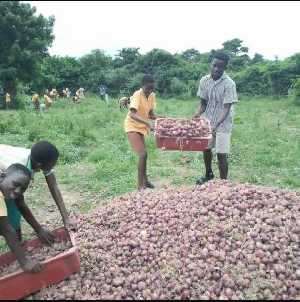The Sagyimase Presbyterian Primary School, located in the Eastern Region of Ghana, has demonstrated the country’s potential to produce its own citronella (onion) locally.

Currently, Ghana spends millions of dollars to import onions from Niger, causing significant strain on the nation’s economy.
However, the efforts of these enterprising students have debunked prevailing notions, proving that Ghana has the capability to reduce or even halt this costly importation. This article calls upon the Ghanaian government to either engage in state onion production or empower local farmers to take up this essential crop.
Furthermore, it emphasizes the urgent need for the Ministry of Food and Agriculture to establish a comprehensive onion production plan, which could potentially stabilize the local currency against the US dollar.
Ghana’s heavy reliance on imported onions from Niger has significantly impacted its economy. Weekly, the country spends at least $2 million on this import from the Niger route alone, a figure that could be significantly reduced through local production.
Niger is the key exporter of dry onions in the West Africa region, responsible for almost two-thirds of total exports in 2021, according to market intelligence platform, Indexbox.

Figures from the Observatory of Economic Complexity (OEC) show that in 2021, Niger exported onions worth $23.4m, making it the world’s 31st largest exporter of onions.
In the same year, onions were the sixth-most exported product for Niger. The main destinations of onion exports from Niger were Ghana ($21.7m), Ivory Coast ($1.15m), Benin ($451,000), Togo ($84,500) and Nigeria ($35,100).
Fortunately, the Sagyimase Presbyterian Primary School has emerged as a beacon of hope, showcasing the country’s untapped potential for onion farming.
Sagyimase Presbyterian Primary School – Setting an Example
Located in the Eastern Region of Ghana, the Sagyimase Presbyterian Primary School has taken the lead in proving that Ghana, the gateway to West Africa can successfully grow and harvest its own onions.
By cultivating citronella on school premises (School Farm), the students have demonstrated their commitment to showcasing Ghana’s agricultural capabilities and challenging dependence on onion imports.
Their success has prompted the need for broad-based action in both the government and agricultural sectors.
Government Intervention and Empowering Local Farmers
Given the potential shown by the Sagyimase Presbyterian Primary School, the Ghanaian government should take immediate action to either embark on state onion production or empower local farmers to step up. This could be achieved through the allocation of funding and resources to support onion cultivation across the country.
Additionally, incentives such as increased access to loans, subsidized fertilizers, and technical assistance should be offered to local farmers to encourage mass production.
Development of a Workable Onion Production Plan
The Ministry of Food and Agriculture led by industrious Bryan Acheampong has a crucial role to play in overcoming Ghana’s onion import dependency. The ministry must develop a comprehensive and practical onion production plan that takes into account soil suitability, climate conditions, and the latest farming techniques. By providing guidance and support to local farmers interested in onion cultivation, the ministry can improve local production and bolster Ghana’s self-sufficiency.
Strengthening the Local Currency
Reducing onion imports would not only enhance Ghana’s economy but also mitigate the impact of currency fluctuations. By producing onions locally, the country would lessen its reliance on foreign markets and stabilize the Ghanaian cedi against the US dollar. This would bring about economic stability, fostering growth and development across various sectors.
Conclusion
The Sagyimase Presbyterian Primary School in Ghana’s Eastern Region has highlighted the untapped potential for onion production in the country. By successfully cultivating citronella locally, these students have proved that Ghana is more than capable of reducing or even eliminating onion imports. It is imperative that the Ghanaian government takes decisive action by either engaging in state onion production or empowering local farmers.
Additionally, the Ministry of Food and Agriculture should develop a comprehensive onion production plan, which will not only enhance the country’s self-sufficiency but also contribute to economic stability. By addressing this issue, Ghana can embark on a path towards agricultural independence and sustainable development.










Discussion about this post